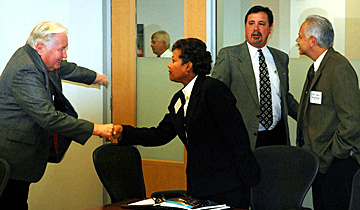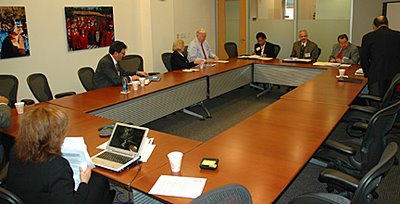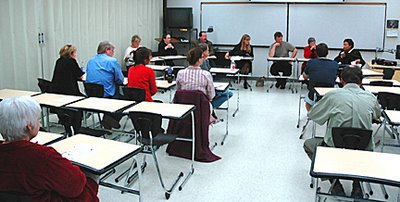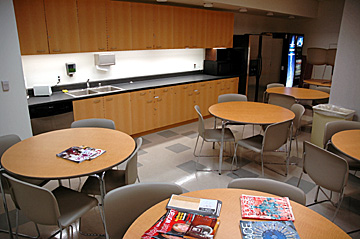
"How can you tell?’’
—Dorothy Parker’s retort when informed that President Calvin Coolidge was deadACCRED DAY
It was “Accred” day at the two colleges of the South Orange County Community College District. At each college, all morning long, two-person “teams” met with various individuals and groups to get the skinny.
Two years ago, the Accreds (ACCJC/WASC), in the form of much larger teams, visited the colleges. They found problems at the top—trustee micromanagement, administrative instability, inappropriate administrative hiring procedures—plus despair, unclarity about roles, etc.
In the end, essentially, each college received a barely-passing “Accreditation” grade of D.
 Despite the district’s declarations to the contrary (Thumbs Up!), each of our colleges was a dunce, sitting in the corner of the room, hoping and waiting to remove that awful hat. But to remove it, each college had to respond to the Accreds’ specific recommendations. (See Accred Action Letter/IVC & Accred Action Letter/Saddleback (pdf files).)
Despite the district’s declarations to the contrary (Thumbs Up!), each of our colleges was a dunce, sitting in the corner of the room, hoping and waiting to remove that awful hat. But to remove it, each college had to respond to the Accreds’ specific recommendations. (See Accred Action Letter/IVC & Accred Action Letter/Saddleback (pdf files).)Recently, the colleges submitted reports that assessed progress in that regard. Today’s visits were an effort by the Accreds to compare the reports with the reality at the colleges.
At Irvine Valley College, the Accred duo’s meetings seemed to go well. As far as I know, the meetings at Saddleback College went well, too.
MEETING WITH THE BOARD
At 2:30, after the aforementioned college meetings, the two teams met with the Board of Trustees at the district offices (at Saddleback College). I attended that meeting. Here’s my report.
I arrived in the Chancellor’s Conference Room on time, and the Saddleback team—Raul Rodriguez and Tony Cantu—were already there, along with six of the seven trustees (John Williams was absent). The Irvine Valley team—Deborah Blue and Mary Halverson—were running late. We waited. At about 2:40, it was decided to start the meeting without Blue/Halverson.

RODRIGUEZ’ REMARKS
Evidently speaking for his team, RODRIGUEZ offered some remarks. He started by noting (repeatedly) that he and his colleague were very pleased with progress at Saddleback College. It is clear, he said, that the college President is doing a fine job.
At the district level too, there’s been progress, he said. The administrative hiring issue seems to be resolved; the formation of an advisory counsel is positive. Last spring’s “technical assistance” activities seemed to be helpful.
Still, he said, issues remain. Micromanagement persists. Episodes are less frequent, but they are “not gone.”
Rodriguez said that he and Cantu spent lunch watching videos of the last two board meetings. The behavior that they saw there is not something that they would want anyone to "emulate," he said. Rodriguez spoke about the importance of “civility” and “respect.”
 Anyone who had attended those meetings—especially the October meeting—knows that Rodriguez was referring to the conduct of certain trustees, some of whom proceeded sans civility interacting with colleagues and staff. (See Blow by blow.)
Anyone who had attended those meetings—especially the October meeting—knows that Rodriguez was referring to the conduct of certain trustees, some of whom proceeded sans civility interacting with colleagues and staff. (See Blow by blow.) Now, during today’s special board meeting, each trustee spoke—with the exception of trustee Don Wagner, who seemed annoyed (but who can tell?), but who remained utterly silent.
Rodriguez said that the board could not really want the kind of national attention they were getting. He referred to the controversy surrounding the board’s decision not to approve a Study Abroad trip to Santander, Spain (Trustee Fuentes objected to Spain’s having withdrawn its troops from Iraq, though other trustees emphasized cost & safety issues). Rodriguez also referred to the controversy surrounding the board’s decision to discontinue the colleges’ memberships in the American Library Association, owing to that organization’s alleged policies and politics. (See Don successfully micromanages.)
“Boards are supposed to be non-partisan,” said Rodriguez, whose demeanor was non-judgmental.
By this time, Blue and Halverson had arrived. Soon, Blue addressed the group. She immediately referred to the three recommendations that the ACCJC had issued to Irvine Valley College (that trustees should cease micromanaging, that groups’ roles and responsibilities should be clarified, and that the “plague of despair” should be addressed). She seemed pleased with the efforts that were being made at the college, but she hastened to add that the college could not address these problems by itself. District leadership, too, must make an effort, if this recommendation is to be met.
Before continuing, she asked the board to offer its assessment of the situation.

TRUSTEES OFFER THEIR ASSESSMENT
● Board President DAVE LANG spoke first. He suggested that the district/college was making “significant progress” on the recommendations. With regard to micromanagement, progress is being made, he said, but there’s still “work to do.” He seemed to make an effort to defend the actions of some board members on the grounds that they have a special “perspective” about their role. For instance, some trustees feel strongly that they must oversee any significant expenditure of funds. He seemed to say that trustees feel that they have a duty to the public to bring their “social beliefs” into their decisions. Some organizations (for instance, the ALA), he said, have attitudes that, in the minds of some trustees, don’t “reflect our community.”
Lang seemed resigned: these differences in “perspective” will likely never be resolved, he said.
Lang agreed that the board hasn’t always set the “best example” at meetings. We have a "way to go," he said.
● Trustee NANCY PADBERG suggested that “some” trustees (no doubt she was referring to John Williams) want board meetings “to last an hour.” She expressed frustration over efforts to “curtail” comments and discussions.
She said that she is “quite concerned” that the two college presidents are treated as though they are on a par with the shared governance groups. She suggested that they ought to be “elevated” at board meetings.
She shared others’ concerns with the unfortunate lack of civility at meetings.
● Trustee MARCIA MILCHIKER said that trustees do try to be pleasant to each other, but that they sometimes yell at each other “in public.” She suggested that being “demeaning” to staff, too, is a problem. Those people are in a difficult position, she said, hinting that they have much to lose by defending themselves. (Again, see Blow by blow.)
She said that she agreed that the colleges should be allowed to join professional organizations that they feel that they must join and that the board should not “meddle” with study abroad programs. (That's "just my opinion," she added.) She stressed that “these are wonderful colleges” and that they should be accredited. She spoke of her wonderful experiences taking a biology course at IVC. She said something about body parts, secured at a "slaughter house," brought to class.
 LANG then interjected a remark—apparently in response to Padberg. He said that meetings should, of course, go on until all the business is done, even if that means going over scheduled time. But it is also important, he said, for trustees to do their homework and to make appropriate inquiries to the Chancellor before meetings. (Nancy wore a sour look.)
LANG then interjected a remark—apparently in response to Padberg. He said that meetings should, of course, go on until all the business is done, even if that means going over scheduled time. But it is also important, he said, for trustees to do their homework and to make appropriate inquiries to the Chancellor before meetings. (Nancy wore a sour look.)● Trustee TOM FUENTES said that he was “grateful” for the teams’ reflections, for, as outsiders, they can be objective. He praised the leadership of the board president, Dave Lang, who, he said, leads with a “light gavel.”
Fuentes seemed to say that our issues in the district are not unique; in fact, they are found everywhere. There will always be tensions between faculty and administration, workers and management, etc.
Returning to an old theme, he complained that the faculty senates and the faculty union should be two bodies, but that, in truth, they are “meshed.” They are “one voice, not two.” Speaking metaphorically (and rather peculiarly), he said that the two groups have “hands held.”
He closed by emphasizing that each community is different and that this board reflects and represents its peculiar constituency. These trustees, he said, know the local constituency, which is not like the constituency of “Beverly Hills.”
● Trustee BILL JAY said he concurred with other trustees’ remarks. He noted that he has been with the district for 33 years, and, he added, he can testify that, in the past, board micromanagement was far worse. This board, he said, is “unusually conscientious.”
At that point, it became clear that only trustee DON WAGNER had not spoken. Everyone seemed to look to him. He said nothing. Lang remarked, finally, that the board knows that it can do better than it has, especially with regard to “civility.” (Arguably, Wagner has been the least civil of our trustees in recent months.)

BLUE’S REMARKS
Lang asked that Deborah Blue relate what she had heard and seen at the college (IVC) today. Blue then explained that she could not share that information, for she and her colleague had assured everyone that their conversations would be confidential.
She said that they were very encouraged by what they saw at the college. People at IVC are working very hard, she said, to establish better relationships and greater trust. They have accomplished “quite a bit.”
Still, she added, challenges remain. The people with whom she spoke were, she said, forthcoming about both strengths and weaknesses. She seemed unwilling to explicate the weaknesses. In general, the two teams’ remarks seemed to me to be punctuated by moments of things left unsaid. This seemed particularly true in the case of Deborah Blue.
But I could be wrong.
THE END
Raul Rodriguez chimed in to say that, at Saddleback College, he had found a “mixed bag.” Certainly, there were some positives. But, as in 1998, now, work must be done to overcome “hostility,” etc.
He emphasized that the board is faced with an “opportunity” to put these problems in the past by continuing to move in the “right directions.” The district, he suggested, does not want to be known for controversy.
Trustee Fuentes (i.e., Mr. Controversy) noted that none of the trustees who ran during the last election cycle were challenged, which suggests a certain level of community support.
Lang then expressed his appreciation for the two teams’ efforts. Everyone smiled, though not immensely. The meeting ended on that middling note. ▲
● ● ● ● ●
 At 12:30, Blue & Halverson met with the IVC Academic Senate
At 12:30, Blue & Halverson met with the IVC Academic Senate
 After the board meeting, the Accreds met with "Chancellor's Cabinet"
After the board meeting, the Accreds met with "Chancellor's Cabinet"Did you know that the district offices have a spacious lounge? Here are two views:


Jeez, that's uptown money!



